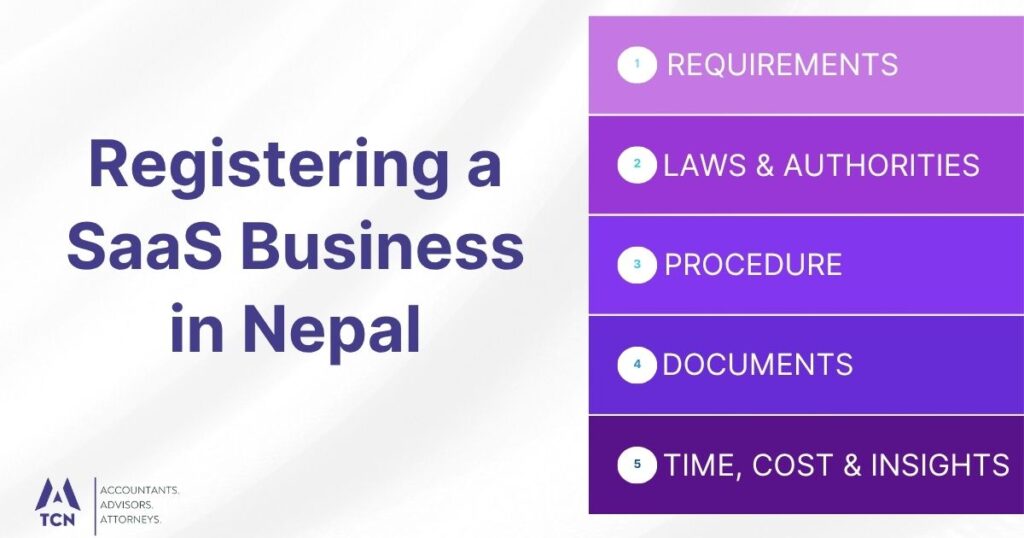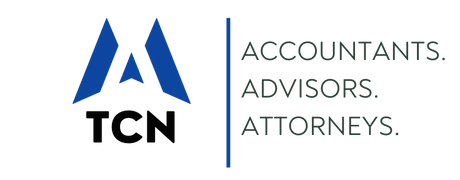Nepal’s digital economy continues to expand rapidly, creating significant opportunities for Software as a Service (SaaS) businesses. The government actively promotes technology-driven enterprises through favorable policies and streamlined registration processes. Understanding the legal framework for SaaS business registration ensures compliance with Nepal’s business laws while maximizing operational efficiency.
The Information Technology Policy 2019 emphasizes digital transformation and encourages software development companies. SaaS businesses fall under the technology sector, benefiting from various incentives outlined in the Industrial Policy 2010. Foreign investors can establish SaaS companies through Foreign Direct Investment (FDI) in Nepal, subject to specific regulations.
Requirements for SaaS Business Registration
Legal Structure Options
SaaS businesses in Nepal can choose from several legal structures. Private Limited Companies remain the most popular choice due to limited liability protection and operational flexibility. The Companies Act 2063 (2006) governs company registration procedures and compliance requirements.
Partnership firms offer simpler registration processes but provide unlimited liability exposure. Sole proprietorships suit individual entrepreneurs but limit growth potential and investment opportunities. Foreign investors typically prefer private limited companies for FDI in Nepal compliance.
Minimum Capital Requirements
The Companies Act 2063 mandates minimum authorized capital of NPR 100,000 for private limited companies. However, SaaS businesses often require higher capital for technology infrastructure, software development, and operational expenses. The Department of Industry recommends adequate capitalization based on business projections.
Foreign investment in Nepal requires minimum investment thresholds depending on the sector. Technology companies benefit from reduced minimum investment requirements under the Foreign Investment and Technology Transfer Act 2019 (FITTA).
Regulatory Compliance Framework
SaaS businesses must comply with multiple regulatory frameworks. The Electronic Transaction Act 2063 governs digital transactions and data protection. The Telecommunications Act 2053 regulates internet-based services and data transmission.
The Income Tax Act 2058 outlines tax obligations for technology companies. SaaS businesses enjoy specific tax incentives under the Industrial Policy 2010, including reduced corporate tax rates for technology exports.
Detailed Registration Process
Step 1: Name Reservation and Approval
Begin the registration process by reserving your company name through the Office of Company Registrar (OCR). Submit Form 1 along with three alternative names for approval. The name must comply with the Companies Act 2063 requirements and avoid restricted terms.
The OCR conducts name searches to ensure uniqueness and appropriateness. Technology-related terms like “Software,” “Tech,” or “Digital” are generally acceptable. Avoid names suggesting government affiliation or regulated activities without proper authorization.
Pay the prescribed fee of NPR 500 for name reservation. The approval process typically takes 2-3 working days. Once approved, the reserved name remains valid for 35 days, allowing sufficient time for document preparation.
Step 2: Prepare Incorporation Documents
Draft the Memorandum and Articles of Association according to the Companies Act 2063 requirements. The Memorandum defines the company’s objectives, authorized capital, and share structure. Include specific clauses for SaaS operations, software development, and technology services.
The Articles of Association establish internal governance rules, director powers, and shareholder rights. Ensure compliance with FITTA requirements if foreign investment is involved. Legal consultation ensures proper drafting and regulatory compliance.
Prepare additional documents including director consent letters, registered office proof, and statutory declarations. All documents must be properly stamped and notarized according to legal requirements.
Step 3: Submit Registration Application
File the complete application with the OCR along with all required documents. Submit Form 2 (Application for Company Registration) with proper signatures from all promoters. Include the approved name reservation certificate and incorporation documents.
Pay the registration fee based on authorized capital as prescribed in the Companies Act 2063. The fee structure varies from NPR 1,000 to NPR 50,000 depending on capital amount. Additional fees apply for expedited processing.
The OCR reviews applications for completeness and legal compliance. Incomplete applications face rejection, causing delays in the registration process. Ensure all documents meet prescribed formats and requirements.
Step 4: Obtain Certificate of Incorporation
Upon successful review, the OCR issues the Certificate of Incorporation, legally establishing your SaaS company. This certificate serves as proof of legal existence and enables business operations. The certificate includes the company registration number and incorporation date.
Collect additional documents including the company seal, share certificates, and statutory registers. These documents are essential for banking, licensing, and operational requirements. Maintain proper custody of all incorporation documents.
The Certificate of Incorporation enables opening bank accounts, obtaining licenses, and entering contracts. It serves as the foundation for all subsequent business activities and regulatory compliance.
Step 5: Complete Post-Incorporation Formalities
Register with the Inland Revenue Department for tax purposes within 30 days of incorporation. Obtain a Permanent Account Number (PAN) and Value Added Tax (VAT) registration if applicable. SaaS businesses typically require VAT registration for service provision.
Open corporate bank accounts with required incorporation documents. Most banks require minimum balance maintenance and specific documentation for technology companies. Choose banks offering digital banking services suitable for SaaS operations.
Obtain necessary licenses and permits for SaaS operations. The Department of Information Technology may require specific registrations for software services. Ensure compliance with data protection and cybersecurity regulations.
Documents Required for Registration
Primary Documentation
The registration process requires comprehensive documentation to ensure legal compliance. The Memorandum and Articles of Association form the foundation of company incorporation. These documents must reflect SaaS business objectives and operational requirements.
Director identification documents include citizenship certificates or passport copies for foreign directors. Proof of registered office through rental agreements or ownership documents is mandatory. All documents require proper authentication and notarization.
Financial Documentation
Submit bank statements or financial guarantees demonstrating capital adequacy. Foreign investors must provide evidence of fund sources and transfer mechanisms. The Nepal Rastra Bank regulates foreign currency transactions and investment approvals.
Audited financial statements may be required for established businesses expanding into Nepal. New ventures must provide capital commitment letters from promoters or investors. Ensure compliance with foreign exchange regulations for international transactions.
Compliance Certificates
Obtain tax clearance certificates from relevant authorities if applicable. Foreign investors require approval from the Department of Industry for FDI in Nepal. Technology companies may need additional clearances from sector-specific regulators.
Environmental compliance certificates may be necessary depending on business operations. Most SaaS businesses have minimal environmental impact but must comply with applicable regulations. Consult legal experts for specific compliance requirements.
Time Frame and Associated Costs
Registration Timeline
The complete registration process typically takes 15-30 working days under normal circumstances. Name reservation requires 2-3 days, while document preparation may take 5-7 days depending on complexity. The actual registration review process takes 7-15 working days.
Expedited processing options are available for additional fees. Priority applications can be completed within 7-10 working days. However, expedited processing depends on document completeness and regulatory approval requirements.
Foreign investment approvals may extend the timeline by 15-30 additional days. The Department of Industry reviews FDI applications separately, requiring additional documentation and compliance verification.
Cost Structure Analysis
Registration costs vary based on authorized capital and processing options. Basic registration fees range from NPR 1,000 to NPR 50,000 as prescribed in the Companies Act 2063. Additional costs include documentation, legal fees, and compliance expenses.
Professional service fees for legal assistance typically range from NPR 25,000 to NPR 100,000 depending on complexity. Foreign investment cases require higher professional fees due to additional compliance requirements.
Ongoing compliance costs include annual filing fees, tax obligations, and regulatory renewals. Budget approximately NPR 50,000 to NPR 200,000 annually for basic compliance requirements.
Post-Registration Compliance Obligations
Annual Filing Requirements
Registered companies must file annual returns with the OCR within prescribed deadlines. The annual return includes financial statements, director information, and shareholding details. Late filing attracts penalties as specified in the Companies Act 2063.
Submit audited financial statements annually to maintain good standing. SaaS companies must comply with accounting standards and audit requirements. Engage qualified chartered accountants for financial statement preparation and audit.
Tax Compliance Obligations
SaaS businesses must file regular tax returns with the Inland Revenue Department. Corporate income tax rates vary based on business type and revenue levels. Technology companies may qualify for reduced tax rates under industrial policy incentives.
VAT registration and filing requirements apply to SaaS service providers. Monthly or quarterly VAT returns must be filed depending on turnover levels. Maintain proper books of accounts and transaction records for tax compliance.
Regulatory Reporting Requirements
Technology companies must comply with sector-specific reporting requirements. The Department of Information Technology may require periodic reports on business activities and technology usage. Data protection compliance requires adherence to privacy regulations.
Foreign-invested companies must submit periodic reports to the Department of Industry. These reports include investment utilization, employment generation, and business performance metrics. Maintain accurate records for regulatory reporting purposes.
Corporate Governance Standards
Maintain proper corporate governance standards as required by the Companies Act 2063. Conduct regular board meetings, maintain statutory registers, and ensure proper decision-making processes. Document all major business decisions and resolutions.
Comply with director appointment and resignation procedures. Notify the OCR of any changes in directorship or shareholding within prescribed timeframes. Maintain updated company information with all regulatory authorities.
Frequently Asked Questions
What legal structure is best for SaaS businesses in Nepal? Private Limited Company structure offers optimal benefits including limited liability protection, operational flexibility, easier access to funding, and compliance with Foreign Direct Investment regulations for international investors.
How long does SaaS business registration take in Nepal? Standard registration process requires 15-30 working days including name reservation, document preparation, and regulatory approval. Expedited processing options can reduce timeline to 7-10 working days with additional fees.
Where should I register my SaaS business in Nepal? Register with Office of Company Registrar in Kathmandu for company incorporation, Department of Industry for foreign investment approval, and Inland Revenue Department for tax registration and compliance requirements.
What are the minimum requirements for SaaS business registration?
- Minimum authorized capital NPR 100,000
- At least one director (Nepali citizen or foreign national)
- Registered office address in Nepal
- Proper incorporation documents and compliance certificates
What are the total costs for registering SaaS business? Registration costs range NPR 50,000-300,000 including government fees, legal expenses, and professional services. Foreign investment cases require higher costs due to additional compliance and approval requirements.


